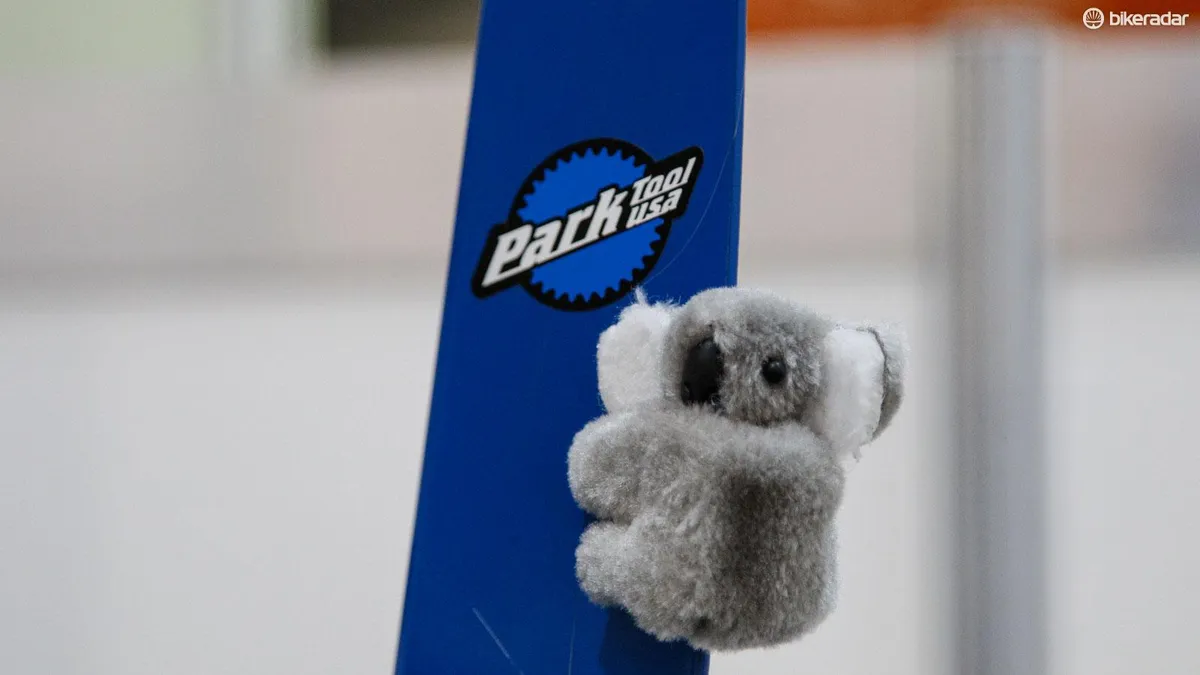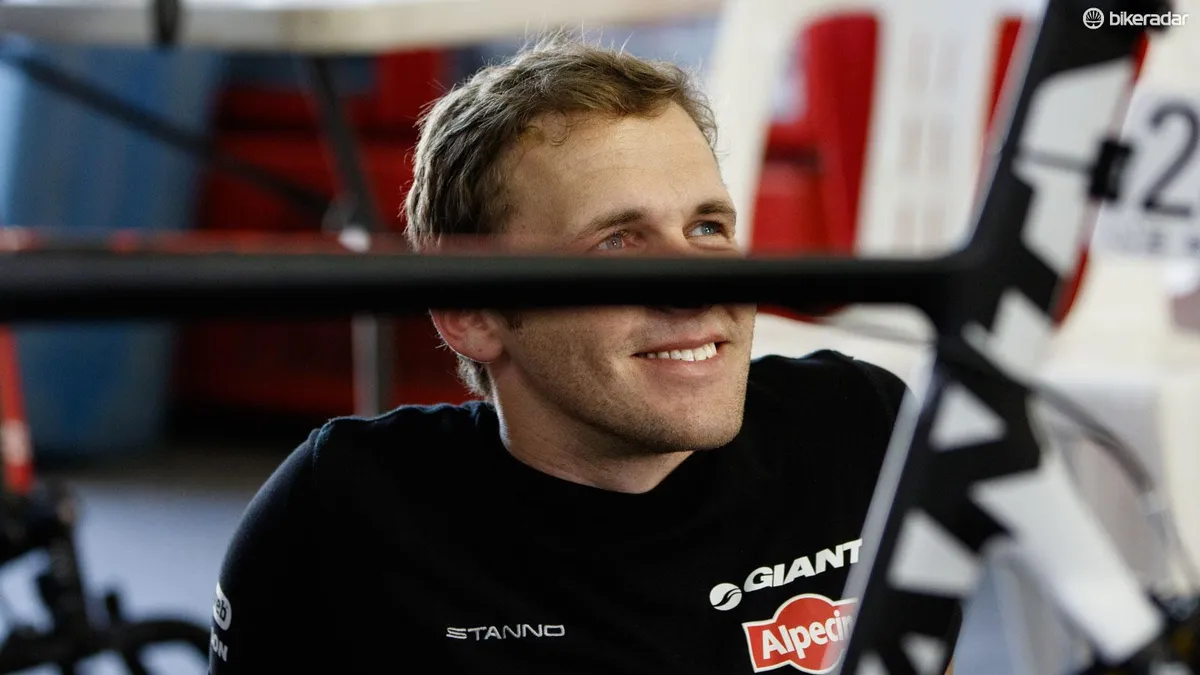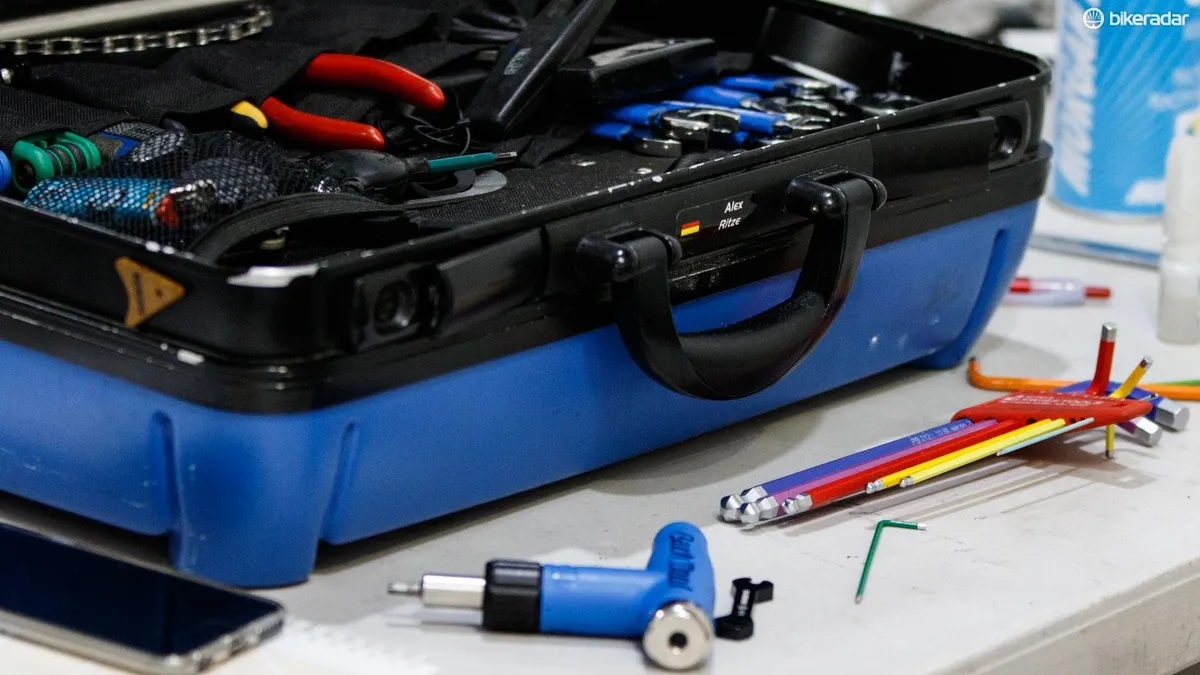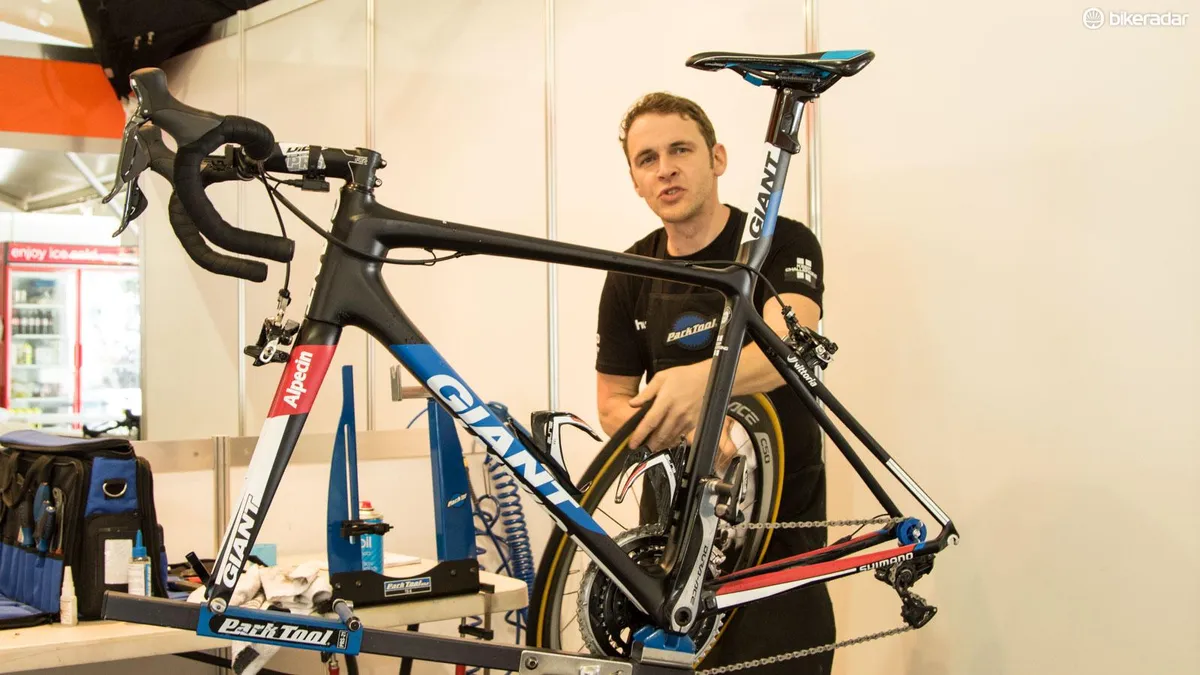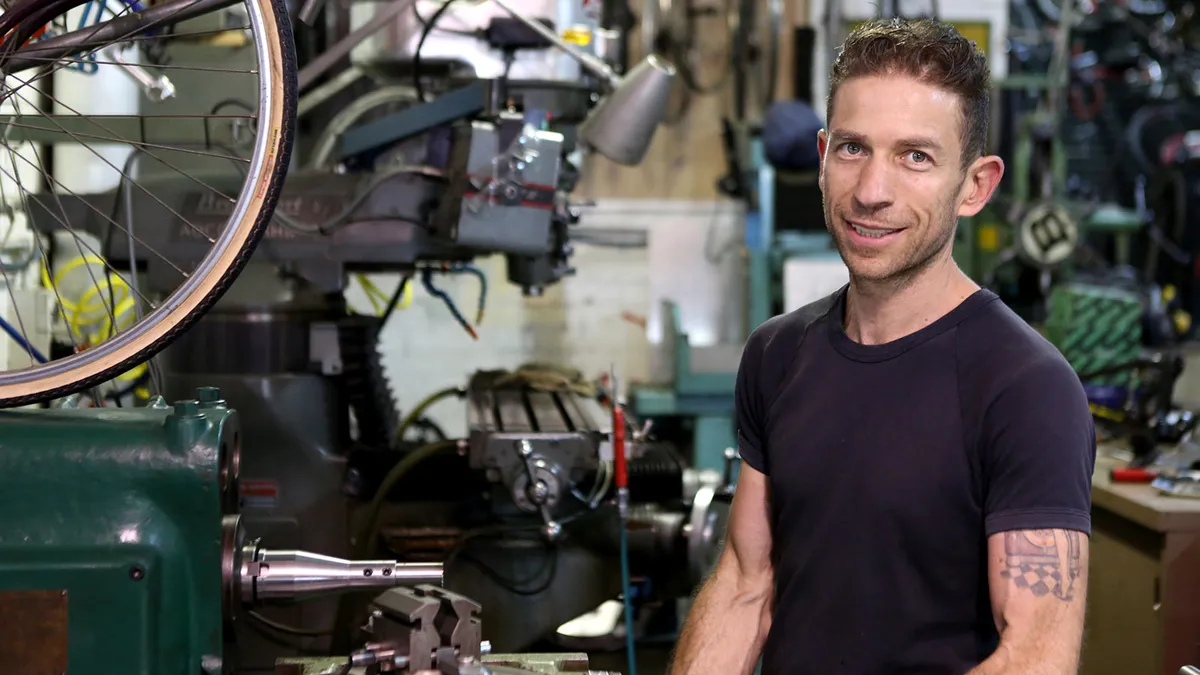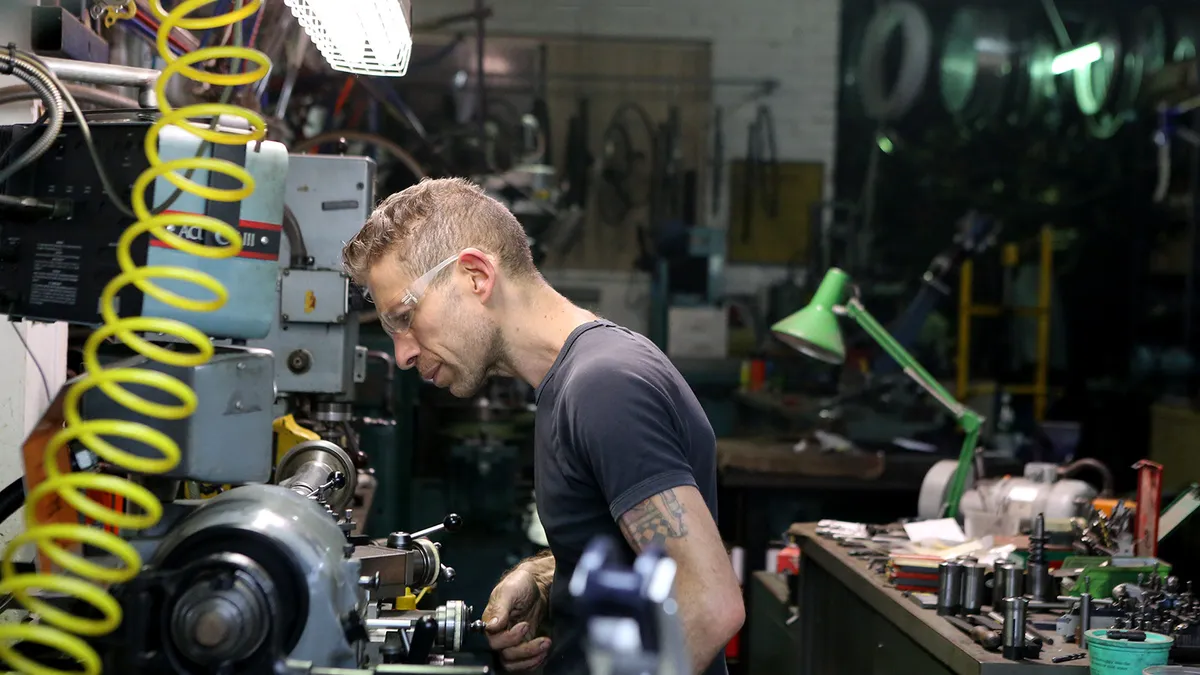Travelling the world and fixing the bikes of the fastest riders would seem like a dream job to many, but for Giant-Alpecin mechanic Alex Ritze, it’s time for something else. Wrenching on the team bikes at the 2016 Tour Down Under, the friendly German mechanic arrived in Australia on a one-way ticket, seeking a fresh start once the racing ended.
That new start awaits in Melbourne, where another lifelong mechanic, Jesse Geisler, will welcome Ritze into his cycle-focused engineering workshop – ‘Bike Bar’. The two first met at last year’s Tour Down Under, where Geisler was working with Drapac Pro Cycling, and have remained in contact since.
Related reading: Day in the life of a pro race mechanic
Geisler’s workshop is a place of frame building (more on that in future); frame tool resharpening; design and manufacture of custom alignment gauges and measurement tools; and high-end bike setup and restoration. Such a setup is certainly not the average bike workshop.
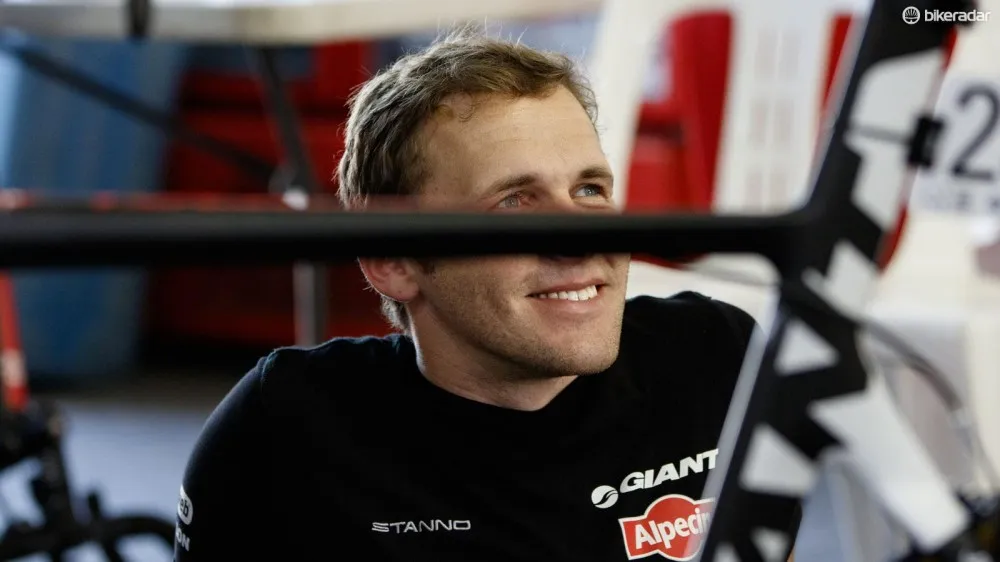
Alex Ritze gives a frame the glad eye
Originally from the city of Erfurt, Ritze has spent the last four years wrenching on the Giant bikes of the team now known as Giant-Alpecin. When not catering toward the needs of famous cyclists, he’s a competitive bike polo player, something he jokingly calls “hipster hockey”.
New beginnings
BikeRadar sits down with Ritze during the Tour Down Under to find out more of his motivation for the new beginning.
“I’ve been with what used to be Argos-Shimano since 2012; I’d been a mechanic in the ladies racing for 10 years or so prior to that. At that time, I was in Girona – I didn’t love it and was looking for something else. I got the call from the team and that’s where I’ve been since,” says Ritze.
“Before I was a race mechanic, I was working in a bike shop. I started when I was at school and continued full-time for about five years. I started to help out at races, it got more and more and then I got offered a job. It’s a common story in the industry, you start by helping out, and then at some point you’re ‘in’.”
We ask Ritze if there are any riders he's found more difficult, or typically fussier to work with.
“We didn’t have the boys with superstar attitudes,” says Ritze of the team, before continuing. “They’re all easy and friendly nice guys. Some are more picky or difficult than others, but it’s a normal thing.”
When pushed on the subject, Ritze, in his modesty laughs and won’t name names. “We had one rider who was always bringing his [spirit] level and tape to ensure his saddle was right," he admits. "It started to become a joke – we’d just give him the bike and let him do what he needed to do.
“As for the rest, it’s actually quite easy. I mean some people really can feel the difference in saddle heights or so, and so you must cater to the rider.”
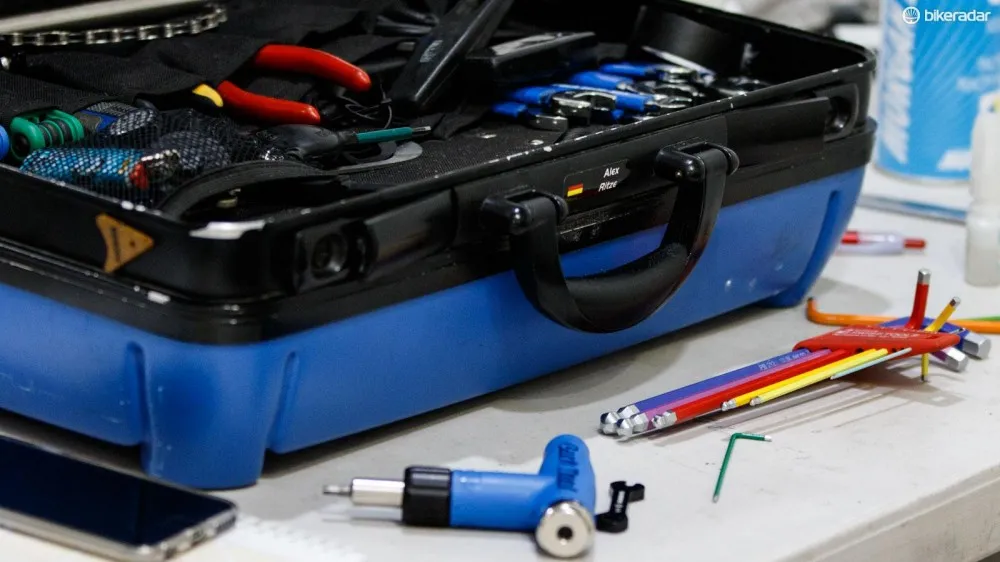
Ritze's work 'briefcase'
One of the challenges in being a pro cyclist or associated staff member is so often being away from home. Ritze was told his season would start early in the year and end by mid October. That time would encompass approximately 180 to 200 days on the road. Ritze says he's enjoyed the travel, and didn’t have a family or partner waiting for him back home.
“I have no regrets of my experience,” says Ritze of the past decade. “If you like travel and like to work on bikes, then for sure it’s a great job.”
Nothing to lose
So why leave then? Ritze pauses. “That’s a good question really… it got to the point where it was just not much new things, same things all day. I wanted a change, I wanted to do something else. I wanted to do something fresh. It’s possible that after six months, I may be like, 'Ah, fuck, I want to go back again,' but you never know. For the moment, I had to do something different.”
For someone with a home and contacts throughout Europe, we're puzzled. Why Australia?
“I got the idea to call Jesse as we met last year at the Tour Down Under. We stayed in contact, and I thought I could ask him and he can say no. So I had nothing to lose,” Ritze says.
“Talking to Jesse, we had a few chats and I got the impression he’s really precise and good at what he does. Of course I could find frame makers in Germany or elsewhere in Europe, I don’t really need to come to Australia, but it’s coincidence and we have a good connection I think – and I have a good feeling about what he does. I thought, why not learn from the best?”
“I had a chance to learn about his frame building business and his tools. I asked if I could help him in exchange for him teaching me his craft, and surprisingly he was positive about it. That’s it. I’ll help out with whatever he needs me to do, but hopefully pick up some new skills along the way."
Ritze points out that there are still one or two cycling tools that don’t really exist, or aren’t yet as good as they could be. He give the example of a device to find the position of cleats on shoes – there are some tools, but nothing that’s the proven solution.
“Jesse is the only guy I know [in Australia] – it’s all-new to me. I don’t know much about Melbourne, I spent an afternoon there during the World’s Championships in 2010. I’m feeling excited, but it feels really strange,” says Ritze during his final days with the Giant-Alpecin team.
No room for mistakes
For anyone seeking to follow in Ritze’s footsteps, he provides an insight that's not hugely surprising, but is a little daunting: “The things that make a great race mechanic are time management, efficiency and precision. You better not make mistakes!
“The work you do repeats many times, and the bikes are all almost the same. You have to stay focused even though the task is repetitive. From a mechanical standpoint, you have to be a good mechanic, but a normal day is more maintenance, checking and cleaning.
"Once the bike is built. It’s not too much mechanical stuff unless there are problems, crashes or the Incredible Hulk throws a bike,” observes Ritze, laughing.
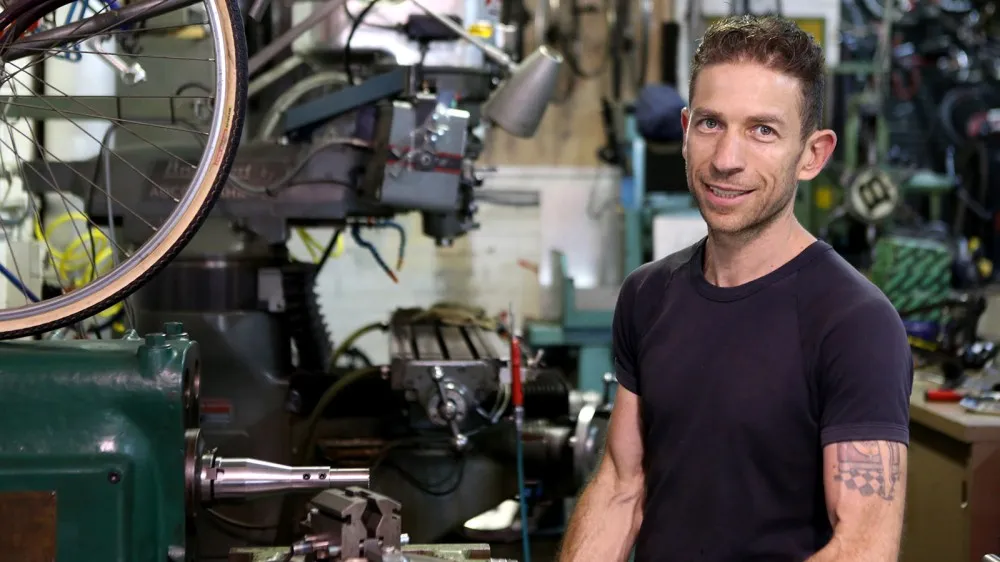
Jesse Geisler in his Fitzroy, Melbourne, based workshop (Image credit: Vito Tassone / inthewhiteroom.com.au)
Following our sitdown with Ritze, we speak with the media-shy Geisler on the matter. The self-employed technician of 23-years is understandably ecstatic at the prospect of working with the departing mechanic.
“Alex suggested migrating to Australia to join forces here at my workshop. Being immersed in the WorldTour for so long has enabled him to pinpoint issues and areas that require development and as such he’s already produced his own unique tools and aims to further develop these ideas with me,” says Geiser.
“I’m excited and honoured to have him make this huge move to Australia to come and work with me, and I’m really looking forward to the process of collaboration and the potential of what it could yield,” he concludes.
This is a story still in its infancy. We look forward to checking back in the near future to see the fruits of this collaboration.
Related: more coverage of the 2016 Tour Down Under on BikeRadar
